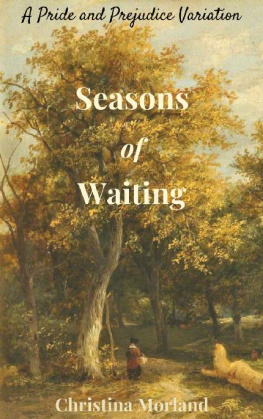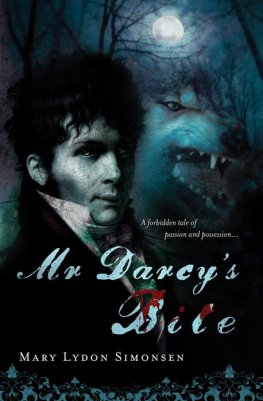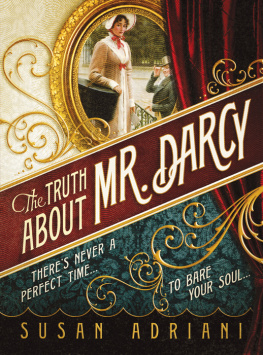SEASONS OF WAITING
Christina Morland
Copyright Pending 2018 Christina Morland
All rights reserved. This is a work of fiction. Names, characters, businesses, places, events, locales, and incidents are either the products of the authors imagination or used in a fictitious manner. Any resemblance to actual persons, living or dead, or actual events is purely coincidental.
Cover Image: The Edge of a Wood by James Stark, public domain image via The Athenaeum
(https://www.the-athenaeum.org/art/detail.php?ID=279739)
To IDH, SKH, and Colleen Cowley
for their patience, love, and support
Table of Contents
EPIGRAPH
PRIDE AND PREJUDICE
Volume III, Chapter XIV
Obstinate, headstrong girl! I am ashamed of you! Is this your gratitude for my attentions to you last spring?.My daughter and my nephew are formed for each other.They are destined for each other by the voice of every member of their respective houses; and what is to divide them? The upstart pretensions of a young woman without family, connections, or fortune. Is this to be endured! But it must not, shall not be. If you were sensible of your own good, you would not wish to quit the sphere in which you have been brought up.
In marrying your nephew, I should not consider myself as quitting that sphere. He is a gentleman; I am a gentlemans daughter; so far we are equal.
True. You are a gentlemans daughter. But who was your mother? Who are your uncles and aunts? Do not imagine me ignorant of their condition.
Whatever my connections may be, said Elizabeth, if your nephew does not object to them, they can be nothing to you.
Tell me once for all, are you engaged to him?
Though Elizabeth would not, for the mere purpose of obliging Lady Catherine, have answered this question, she could not but say, after a moments deliberation,
I am not.
Lady Catherine seemed pleased.
And will you promise me, never to enter into such an engagement?
I will make no promise of the kind.
~Jane Austen
PART I: RIFTS AND REUNIONS
CONFESSIONS
DECEMBER 1832
The room was silenta sure sign of his aunts imminent demise, for only death could silence Lady Catherine.
It was an uncharitable thought, but Darcy could not bring himself to regret it. Had she been in terrible pain or faced an untimely death, he would have worn the solemnity expected of him. But his aunt was resting comfortably and would die as well as any human could expect to die. By all standards, she had lived a long and happy life.
At least, he supposed it to have been happy, for Lady Catherine de Bourgh had never been one to express happiness in the usual ways. Her smiles were thin, her laughter harsh, her compliments always tinged with underlying criticism. When she got her wayeven when she witnessed the ceremony that brought to fruition her most sought-after dreamshe expressed so little in the way of joy that Darcy suspected her of being constitutionally incapable of that sentiment most humans considered their birthright.
So he was hardly surprised to find his aunts face pinched with displeasure now, as if she would confront the grim reaper with the same irritable expression she had used to greet lifes more pleasant visitors. What did surprise him was his presence at her bedside; he had been called there nearly an hour ago, and no one, not even death, had dared interrupt their silent conference.
He did not mind the silence as once he might have. One of the benefits of reaching an advanced age was patience, or at least resignation. Darcy at eight and twenty would have paced the room like a caged tiger; Darcy at eight and forty sat with a stillness matched not even by the woman dying in bed.
She shifted a little to the left, then a tad to the right, her breath coming in short, shallow pants as she reached for his hand, only to push it away again. This back and forth happened nearly a dozen times, and again, he marveled at how age had changed him: his younger self would have grabbed her hand on its first retreat. This he would have done not to soothe or reassure her, but to still his own annoyance.
Now, though, he allowed her to go through the motions without interruption. He wondered briefly if she required something, but when offered water, brandy and laudanum, she refused them all with an adamant shake of her head. Whatever ailed her came from some internal struggle he could not hope to understand, and so he watched her with dispassionate interest. He knew too much of Lady Catherine to feign more than the abstract concern any man would feel watching another person breathing her last.
Finally, she took hold of his hand and shuddered. He tensed, waiting for the death rattle, but was surprised yet again: she opened her eyes wide and said, I must tell.
When she did not continue, he asked, Would you like me to bring Anne to you now?
No, no! She squeezed his hand with exceptional vigor, and he began to wonder if perhaps the physician had been premature in his prognosis. I must tell you .
He sighed. This was an old game, one hardly novel to the deathbed. When she had lost the right to command Anne, she had begun ordering him to command in her stead: Tell Anne that she ought to write more. Tell Anne that green makes her appear sickly. Tell Anne to avoid those heavy cakes; she has grown quite plump!
Anne had grown plumpa minor miracle, as far as he was concerned, and one that pleased him mightily. Of course, he never told Anne he thought her plump; even he knew enough of women to guess that she would like that word no more than her mother did. So he called her healthy, which was just as true and even more miraculous.
Darcy did not consider it boasting to claim that Annes reversal of fortunes had largely been a result of his efforts. Serving as buffer between his cousin and her mother had been only one of the services he had rendered her over the years. Anne, too, had been a buffer of sorts, and most certainly a friend; and though he had not grown plumper (in fact, he was sometimes described as gaunt, but only when others thought he could not hear), Darcy had softened in a different, no less important way over the course of their nearly two-decade marriage.
If you have a message for Anne, he said to Catherine in that soothing voice he sometimes used on the odd tenant who drank too much and grew bellicose, you had best tell her yourself.
No, I must tell you!
Now her grip was painful.
I must tell you, she said, of Miss Elizabeth Bennet.
And there, finally, was his heart.
Though it had performed all the anatomically-correct tasks assigned to it, his heart had seemed strangely absent of late. He had felt no sadness on receiving word that Catherine was nearing her end, no sense of urgency on the long journey from Derbyshire to Kent, no pity when seeing her on her deathbed.
Yet now, on hearing her name, that strange, twisted muscle in his chest beat madly against his ribcage, sending blood to his head and making him feel both sick and alive in a way he had not experienced since coming to Rosings. Perhaps not since he had been eight and twenty.
Whatwhat of her?
She did not say the words, his aunt replied, coughing so violently that he could only just make out her speech.
He fought the urge to shake her by the shoulders and demand a clearer recitation. Instead, he took a deep, calming breath (a trick Anne had taught him; she had acquired a great deal of practice during her youth at Rosings).
What words do you mean, Aunt?
Aunt. Aunt! You always call me aunt! Am I not your mother now, too? Anne has stopped calling me mother. Why does she not call me mother? Headstrong and obstinate girl!
Her voice now was clearer, stronger, but this worn-out conversation was not the one he wanted to have.
What words do you mean? he asked again.
Next page








